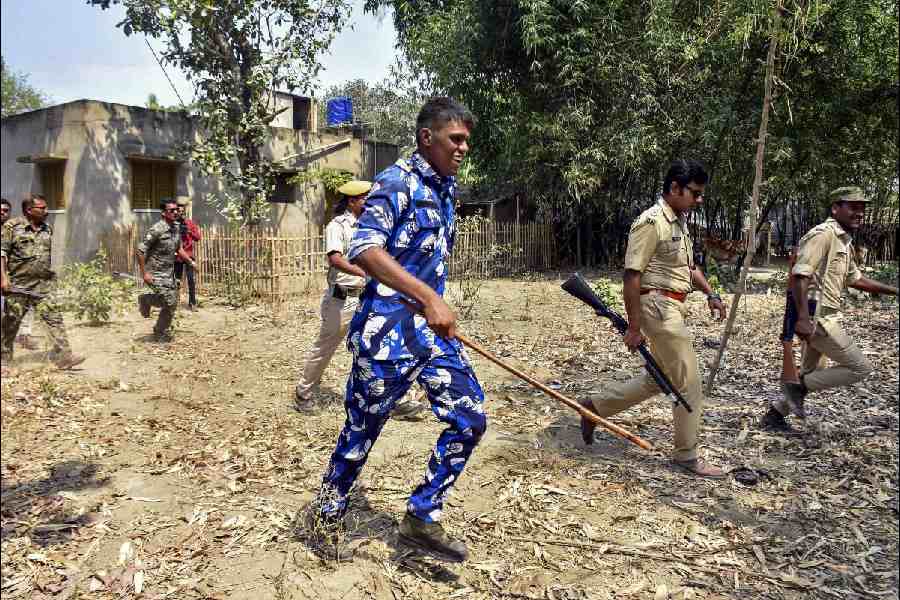Safe substitute
Sir — Robot replacements are the subject of much fear across the world as they are increasingly taking up human jobs. But not all robot replacements are bad. A temple in Kerala has introduced a robotic elephant, equal in size and shape to temple tuskers, for performing ritualistic duties. The robot elephant, named Irinjadapilly Raman, is made of iron and has a rubber coating. The elephant has been offered to the temple by PETA India. It is hoped that this robot pachyderm will reduce accidents that have injured devotees in the past and ensure that animals are not hurt for ritualistic purposes. Could there be a case to make more such robotic animals to stem the trade in exotic species? A mechanical fox or an electronic rattlesnake might just save their live brethren.
Chandreyee Sen, Burdwan
Needless confusion
Sir — Medical students are under great stress owing to the Centre’s decision to scrap the final MBBS exam and replace it with the National Exit Test. The Union health ministry and the National Medical Commission should immediately issue guidelines that will dispel the students’ apprehension. The absence of a specific timeline for the implementation of NExT has made it hard for final-year students to prepare for both the traditional MBBS theory exam as well as the multiple choice questions-based syllabus of NExT, whose curriculum varies vastly from the MBBS final exam.
Unmesh Kundu, Siliguri
Curb the menace
Sir — Preethi Dharavath, a post-graduate medical student at the Kakatiya Medical College, Warangal, committed suicide after she was allegedly ragged. The possible causes for the high rate of suicides among students need to be probed. Campuses must institute a zero-tolerance policy for ragging. Further, counsellors should be available for those who need help.
D.V.G. Sankararao, Andhra Pradesh
Vulnerable lives
Sir — The editorial, “Privacy for all” (Feb 25), highlighted that the right to privacy is a fundamental right guaranteed to each citizen, including children. In this context, it must be mentioned that the trend of posting selfies and personal information on social media can make children vulnerable to exploitation. Thus, parents should not only respect the privacy of their children but also maintain a healthy relationship with them so that children can approach them for help. Indian society still has a long way to go to understand the basic tenets of privacy.
Kiran Agarwal, Calcutta
Rising star
Sir — Sayantan Das recently became West Bengal’s 11th and India’s 81st Grandmaster at the Cannes Open. Chess has become a fairly popular game of late and many Indian Grandmasters are successfully taking part in international competitions.
Fakhrul Alam, Calcutta
Green initiative
Sir — The initiative by the residents of Salt Lake’s AE block to clean a park in the area is exemplary (“Authorities ‘inert’, residents clean Salt Lake park”, Feb 27). Most parks in the city have become dump yards owing to the lack of proper upkeep by the authorities. It is heartening that residents understood the import of having a clean neighbourhood and showed great civic sense.
Jayanta Datta, Hooghly
Canine stress
Sir — It is sad that there has been a spate of attacks by stray dogs recently. State governments are largely responsible for these accidents as they have failed to carry out effective sterilisation campaigns which has led to an exponential growth in the number of strays. But there are other reasons why dogs are agitated. One such reason could be noise pollution. An animal that has acute hearing is bound to be disturbed by this. The government should work with not-forprofit organisations to carry out sterilisation campaigns and open more shelters for dogs so that there are fewer strays on the streets.
Abhijit Roy, Jamshedpur
Easy platform
Sir — Education forms the backbone of society and e-learning has become the primary educational platform for the present generation. Higher educational institutions as well as industries are increasingly using advanced technology to provide training. E-learning has created massive opportunities to acquire diverse knowledge on the internet without wasting time and money on physical classes.
C.K. Subramaniam, Navi Mumbai
Knowledge is power
Sir — It has been two years since the government issued the Information Technology (Intermediary Guidelines and Digital Media Ethics Code) Rules through which the ministry of electronics and information technology was given the task of regulating content on OTT and online platforms. India’s approach can be termed as a co-regulation model where there is self-regulation at the industry level and a final oversight mechanism at the ministry level. Initiatives aimed at enhancing media literacy and transparency will help in furthering the objective of these rules and realising the efficacy of self-regulation and empower millions of OTT consumers.
K. Basu, Calcutta
Spend wisely
Sir — A lot of money is wasted on celebrating birth and death anniversaries and in constructing statues of political leaders. Instead of these gimmicks, the State exchequer and party funds should be used for the development of hospitals, educational institutions and so on.
N. Mahadevan, Chennai










